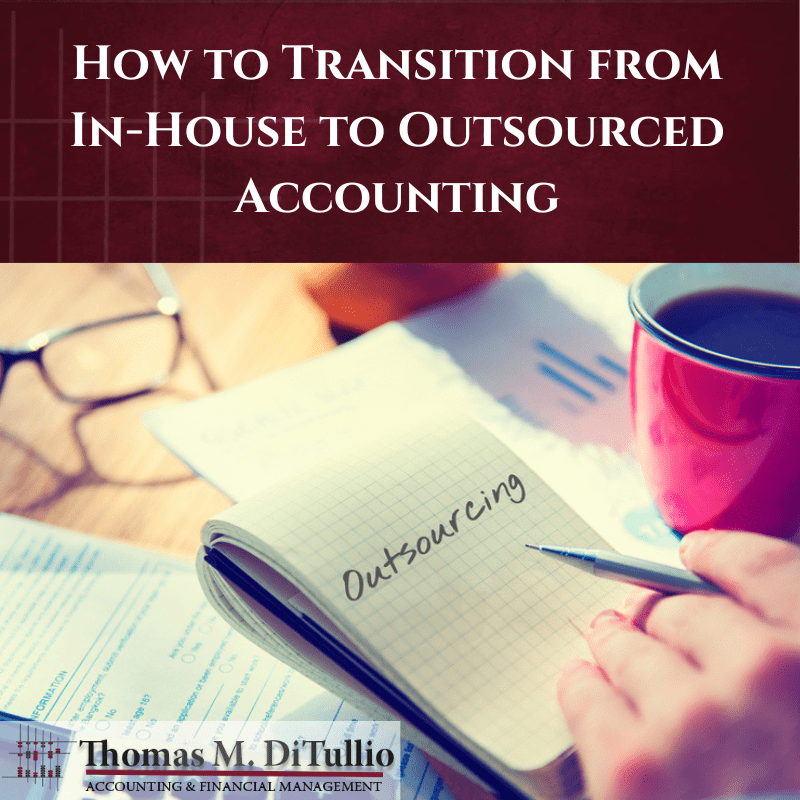How to Transition from In-House to Outsourced Accounting
As your business expands, self-managing your finances can quickly become daunting. Many companies, which initially handle their accounting in-house, often realize that outsourcing is a more efficient option. While outsourcing your accounting may seem like a relief, transitioning from in-house to outsourced accounting can be challenging. Here are a few tips to help you make the transition as seamless as possible.
Pros and Cons of Using an Outsourced Accountant
Outsourcing eliminates the time and costs of the hiring process. Along with that, it provides access to expert accountants and bookkeepers. Additionally, outsourcing makes it easier to scale accounting services, leverages automation technologies, and provides a valuable advisor to help make the process more efficient. By choosing the right outsourcing company, you can ensure that your accounting is in the hands of a reliable and knowledgeable firm.
One of the main disadvantages of using an outsourced accountant is a need for more control over the quality of the work. When you outsource small business accounting services, you rely on a third party to manage crucial financial information. It can be challenging to monitor their performance and ensure that the work is being done accurately and efficiently.
Another potential issue is a need for more direct collaboration with your accountant. When working with an outsourced accountant, communication may be limited to email or phone calls, making it more difficult to establish a close working relationship and receive timely and personalized support.
Make the Switch by Choosing the Right Partner
Choosing the right financial partner is vital to a successful accounting transition. With the right support, the process can be smooth and effective. If you want to ensure that you choose the best fit for your business, consider the following qualities when selecting an accounting firm.
Proactivity
A good accounting firm should be proactive in helping you transition from in-house accounting to outsourcing as seamlessly and stress-free as possible. If they aren’t offering support during this stage, it may be a sign that they are not the right fit for your business.
Communication
A strong communication style is crucial in any business relationship. Look for responsive, clear, and proactive communication from the accounting firm.
Expertise
Make sure the accounting firm you choose has the experience, knowledge, and technology to meet your needs. You will want to consider their track record and reputation in the industry.
Customer Focus
A quality accounting firm should be in tune with your needs from the start. You want them to be committed to making your life easier. Your prospective accounting firm should be customer-focused and dedicated to your success.
Get an Early Start With the Right Plan
When transitioning from in-house accounting to outsourcing, you need to plan and budget enough time for the process. You want to ensure that your financial statements and reports are received promptly. Keep in mind that the switch may take several weeks to complete. To make the transition as smooth as possible, plan to spend two to four weeks gathering your financial records and documents for your new accounting firm.
Once you’ve handed over your financial records to your new accountant, they should be able to provide you with an estimate of how long it will take to start monthly accounting services. Remember that if you need to catch up on bookkeeping or taxes, your accountant will need to complete them before moving forward with future financial statements. On average, it takes 60-90 days to complete one year’s worth of back taxes.
You should be cautious of accountants who make unrealistic promises, such as claiming the transition will be “a breeze” or take “no time.” These promises may be a sign that the accountant needs to be more serious about the financial health of your business. On the other hand, if they finish the work too quickly, you might want to be skeptical of the quality of their work.
Set Achievable Goals
Before transitioning to outsourced accounting, you will want to understand and communicate your specific pain points and goals. Knowing why you want to outsource and what you’re nervous about can help establish clear expectations and ensure a successful partnership with your new accountant.
To get the most out of your accounting relationship, take the time to list everything that frustrates you about your current accounting process and your future financial goals. By providing this information to your accountant, they will better understand your needs and tailor their services to meet those concerns.
A quality accounting firm will have established processes to ensure your success, including meetings designed to help you establish best practices and a plan for working toward your financial goals. Your accountant should thoroughly understand your business and be equipped to provide the guidance and support you need to succeed.
Find an Accountant
Transitioning from in-house to outsourced accounting can be a significant step for your business. Whether you have an in-house accountant or use a combination of an in-house bookkeeper and an external accounting professional, there are certain advantages to working with an outsourced accounting service.
By following these tips, you can be better equipped to smoothly transition to outsourced accounting and enjoy the benefits of working with a professional and experienced South Jersey accountant.
Choose TMD Accounting for Your Small Business
We are a family-owned and -operated accounting firm. We have helped numerous clients over the years. Whether you need help with payroll or taxes, we are here to assist you. Schedule a consultation by calling 856-228-2205.

